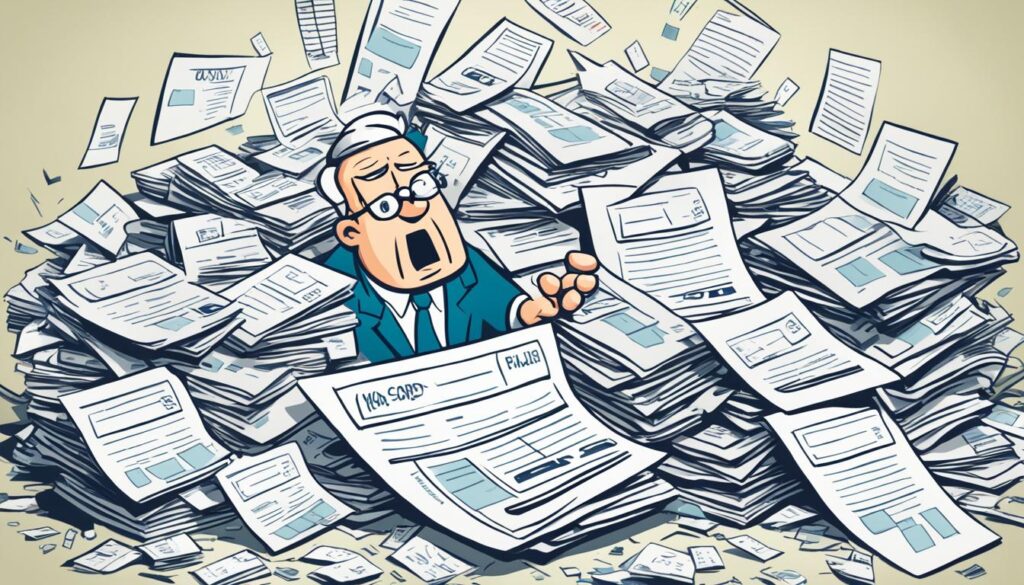Proper1 bookkeeping is key for a small business to thrive. It helps you keep track of your money, understand your financial health, and make smart choices for growth1. Having accurate financial records is vital for taxes, getting loans, and drawing in investors. By keeping your books in order, you can manage your money better, plan for the future, and spot trends that help shape your business strategy.
Bookkeeping is crucial for your business’s financial health and success over time. It gives you the data and insights you need to make confident decisions that move your company forward1. Using a Chart of Accounts (COA) to organize your money into different categories makes tracking and reporting easier1. Automating your bookkeeping with software cuts down on errors, gives you updates in real time, and makes tax time easier.
Key Takeaways
- Proper bookkeeping practices are essential for small businesses to track financial health and ensure tax compliance.
- Common bookkeeping mistakes include mixing personal and business finances, failing to keep receipts, and neglecting bank statement reconciliation.
- Utilizing a Chart of Accounts and automated bookkeeping software can improve financial tracking and reporting.
- Understanding tax obligations and staying informed on tax laws are crucial for meeting regulatory requirements.
- Systematic organization and planning can streamline tax preparation and ensure timely submissions.
The Importance of Bookkeeping for Small Businesses
Keeping accurate financial records is key for small businesses2. Bookkeeping helps small business owners track their money, assets, and debts. This gives them a clear view of their finances2. It’s vital for making smart choices, following tax laws, and finding ways to grow.
Accurate Financial Records
Good bookkeeping means small businesses have a full record of their money moves2. The IRS wants businesses to keep track of many things, like sales, buys, and employee taxes2. Having these records makes filing taxes easier and helps during IRS checks2.
Informed Decision-Making
With the right financial records, small business owners can make smart choices2. They can plan budgets, get loans, and see if their business is making money23. Bookkeepers are key in watching cash flow and keeping an eye on assets, which helps with big decisions3.
Tax Compliance and Growth Opportunities
Keeping accurate records is a must for following tax laws2. Good bookkeeping makes filing taxes easier for everyone2. It also helps businesses grow by making them look good for loans or investors23. For businesses looking for investors, having the latest and correct financial records is key to showing they’re doing well3.
By focusing on bookkeeping, small business owners can improve their financial management and set their businesses up for success23.
| Bookkeeping Benefits | Description |
|---|---|
| Accurate Financial Records | Comprehensive record of financial transactions, facilitating tax filing and IRS audits. |
| Informed Decision-Making | Provides data for budgeting, loan applications, and assessing profitability. |
| Tax Compliance and Growth Opportunities | Ensures tax compliance, saves time, and opens up opportunities for financing and investment. |
“Bookkeeping is the foundation of a small business’s financial health. It provides the essential data needed to make informed decisions and plan for the future.”
Common Bookkeeping Mistakes to Avoid
As a small business owner, keeping up with bookkeeping can be tough. But, it’s key to avoid common mistakes to keep your financial records right. This helps your business do well in the long run4.
Mixing Personal and Business Finances
One big mistake is not separating your personal and business money. Mixing them up can make bookkeeping harder and might hurt you in audits or legal issues4. It’s important to have separate bank accounts and credit cards for your business. This makes managing your money easier5.
Failing to Keep Receipts and Documentation
Keeping good records is key for your business’s money health. Not saving receipts and documents for all buys can make tracking expenses hard. This can lead to trouble when you’re doing taxes4. Losing or not handling receipts right can cause big problems during audits, leading to fines and penalties5.
Neglecting Bank Statement Reconciliation
Reconciling your bank statements often is a must for accurate money records. Not doing this can cause differences between your records and the bank’s, making finding mistakes hard4. It’s important to match your financial books with bank statements to know your money’s true state and find errors5.

Avoiding these mistakes makes managing your business’s money easier and keeps you in line with the law. Keep your personal and business money apart, keep detailed records, and check your bank statements often. This sets your business up for success456.
Getting Started with DIY Bookkeeping
Starting with DIY Bookkeeping might seem hard, but learning the Bookkeeping Basics helps a lot. Begin by getting to know key ideas like income, expenses, and assets. Most businesses use Double-Entry Bookkeeping, a method that records each deal twice for accuracy7.
Then, open a Business Bank Account to keep your personal and business money separate. This makes tracking easier and more precise7. Pick a bookkeeping way that suits you, like spreadsheets, cloud tools, or a specific bookkeeping app. It’s important to log all deals quickly. Keep track of expenses, income, and receipts. Categorizing your spending helps you see where your money goes and gives you useful financial insights7.
DIY bookkeeping breaks down into three main parts: checking deals, matching bank statements, and making financial reports7. Getting good at these steps helps you keep accurate financial records and make smart business choices8.

Now, bookkeeping software is easier to use than writing everything down by hand, which was the old way7. In ZipBooks, a green check mark means a deal is confirmed, and a grey check mark means it’s not yet confirmed7. Common reasons for bank balance differences include missing or extra deals, mistakes, and missing fees7.
Reports from accounting software can show how your business is doing over time, its value, what you owe others, taxes paid, and deductible costs7. Keeping up with bookkeeping lets you make smart choices to grow your Small Business9.
“Accurate bookkeeping is the foundation for financial control and business success.”
Organizing Your Financial Documents
Keeping your financial documents in order is key for good bookkeeping and following tax laws. Start by making a filing system that fits your business. It doesn’t matter if you use physical folders or digital storage. What’s important is being consistent and able to find things easily10.
Creating a Filing System
Label each folder clearly and sort documents by type and date. For a simple system, use folders for each year and subfolders for different document types10. Giving each invoice or document a unique number makes finding them easy10.
Utilizing Digital Tools
Digital tools can make organizing documents easier. Think about scanning paper documents and storing them online or in bookkeeping software10. This saves space and keeps your data safe with regular backups11.
Maintaining Financial Agreements
Don’t forget to keep copies of financial agreements like contracts with vendors and clients10. Having your financial documents in order helps with accurate bookkeeping. It also makes it clear where money came from and where it went.
Set aside a little time each week to organize your financial papers. This is better than waiting until the end of the month or quarter10. By keeping a regular routine for organizing documents, you’ll save time when it’s tax season or during audits. Plus, your financial documents will always be easy to find10.
| Document Type | Recommended Retention Period |
|---|---|
| Year-end bank/brokerage/retirement statements, cancelled checks, credit card statements, major expense documentation, income tax returns, and supporting documents | 7 years |
| Home improvement records, cost basis of investments, vehicle titles, service contracts/warranties, real estate deeds and settlement sheets, loan statements, and stocks, bonds, and CDs | Keep until disposal |
| Listing of safe deposit box contents, monthly bank statements, quarterly retirement and pension statements, list of credit card numbers, annual insurance policy statements, and inventory of household items | Keep until updated |
| Personal letter of instruction, family history, wishes for family members, and any other critical documents | Permanent retention |
“Organized financial documents aid in accurate record-keeping and provide a clear financial trail for transparency and accountability.”
Bookkeeping: Setting Up Your Chart of Accounts
Starting to organize your business finances means creating a detailed Chart of Accounts (COA). This list shows all your financial accounts. It helps you see your assets, liabilities, equity, income, and expenses12. To make a good COA, sort your transactions into main groups. You can then break these down further into sub-categories13.
Categorizing Financial Accounts
First, list the different financial accounts your business uses12. These might include things like bank accounts, inventory, and money you owe others12. On the income side, you’ll have accounts for sales and other earnings. Expenses could be rent, shipping, and office supplies12. Putting your transactions into these main groups makes it easier to understand your finances14.
Numbering and Naming Conventions
Give each category in your COA a unique number and name12. Start with assets (1000s), then liabilities (2000s), equity (3000s), income (4000s), and expenses (5000s and up)12. This method makes it easy to find and track your financial activities13. Keep your account names short and clear to avoid confusion14.
Updating Your Chart of Accounts
Keep your COA current as your business changes13. You might need to add new accounts, change old ones, or stop using some14. A well-kept COA helps you keep accurate financial records. It makes tax time easier and helps with big decisions12.
FAQ
Why is bookkeeping crucial for small businesses?
Bookkeeping is key for small businesses to keep track of their money and health. It ensures accurate records, vital for smart decisions. Without it, you might face big mistakes, tax problems, and miss growth chances.
Good bookkeeping also helps with audits, loan applications, and drawing in investors.
How do accurate financial records benefit small businesses?
Accurate financial records help small businesses understand their money well. They show your income, expenses, and what you own and owe. This info helps with investments, spending, and planning.
It’s also key for following tax laws and growing your business by getting loans or attracting investors.
What are some common bookkeeping mistakes that small business owners should avoid?
Small business owners often make mistakes in bookkeeping. Mixing personal and business money can cause confusion and tax issues. Not saving receipts and documents makes tracking expenses hard during tax time.
Not checking your bank statements often can hide financial mistakes.
How can small business owners get started with DIY bookkeeping?
Starting DIY bookkeeping might look tough, but it’s doable with the basics. Learn about income, expenses, and other key terms. Most use double-entry bookkeeping to keep records right.
Open a business bank account to keep your money separate. Choose a bookkeeping method that suits you, like spreadsheets or software. Recording all transactions is key to keeping accurate records.
Why is proper organization of financial documents important for bookkeeping?
Organizing your financial documents is vital for good bookkeeping. Create a system for saving receipts, invoices, and other important papers. Use digital tools to make it easier.
Back up your files to avoid losing them. A good system saves time during tax season and audits. Keeping all financial papers in order helps with accurate records and transparency.
What is a Chart of Accounts, and how can it help with bookkeeping?
A Chart of Accounts (COA) lists all your business’s financial accounts. It gives a clear view of your finances. To make one, group your transactions into assets, liabilities, equity, income, and expenses.
Update your COA as your business changes. A well-organized COA helps track finances, makes taxes easier, and aids in planning.
Source Links
- https://www.doola.com/blog/simplify-your-business-finances-a-beginners-guide-to-bookkeeping/
- https://www.patriotsoftware.com/blog/accounting/why-is-bookkeeping-important-small-business/
- https://www.lewis.cpa/blog/reasons-why-your-small-business-needs-a-bookkeeper
- https://www.bench.co/blog/bookkeeping/common-bookkeeping-mistakes
- https://www.score.org/resource/article/top-10-bookkeeping-mistakes-small-businesses
- https://bookkeepers.com/small-business-bookkeeping-mistakes/
- https://zipbooks.com/blog/diy-bookkeeping-3-easy-steps/
- https://www.nerdwallet.com/article/small-business/small-business-bookkeeping
- https://www.modernsoapmaking.com/blog/getting-started-with-bookkeeping
- https://www.freeagent.com/guides/bookkeeping/paperwork/
- https://www.forbes.com/sites/mikehelveston/2016/09/09/organize-your-financial-documents-with-these-10-helpful-categories/
- https://quickbooks.intuit.com/accounting/chart-accounts/
- https://www.xero.com/us/guides/how-to-do-bookkeeping/chart-of-accounts/
- https://www.patriotsoftware.com/accounting/training/help/setting-up-your-bookkeeping-accounts/




